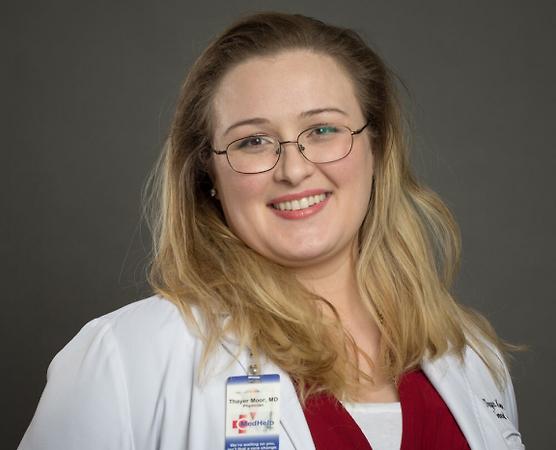
A closer look at primary care at MedHelp
Mar 29, 2021 | Family Medicine | Share:
Most people know that MedHelp is an urgent care clinic, but we also offer primary care medicine at all five of our Birmingham clinics. We talked to Dr. Thayer Moor, one of our primary care providers at MedHelp Lakeshore, to learn more about primary care at MedHelp.
Who needs a primary care doctor?
According to Dr. Moor, “Everyone needs a primary care doctor. A lot of women will fall into the trap of using their OB/GYN as their primary care doctor, but it’s important to remember that these doctors specialize in obstetrics, not internal medicine. A generalist who specializes in family medicine or internal medicine is better able to treat whole-body issues.” Dr. Moor emphasizes the importance of having a primary care doctor for everyone whether you’re male or female, young or old, healthy, or dealing with multiple chronic conditions.
Why should you have a primary care doctor?
Your primary care doctor is your go-to provider for staying healthy and for treating any new medical issues. Dr. Moor says, “I try to focus on preventative health with all of my patients, providing coaching and education. If they develop health issues that can’t be treated in a primary care environment, I serve as the quarterback for their care. I’m able to find specialists that are a good fit for my patients and I’m able to coordinate therapies with multiple sub-specialties to make sure my patients are receiving streamlined and effective care from all of their doctors.”
Dr. Moor also emphasizes the importance of finding a primary care doctor when you’re healthy. “As primary care doctors, we can help our healthy patients really understand and own their health. And we’re there for them when they do have health issues so we’re able to get them on the road to health much easier.”
Many people are in the habit of hopping from urgent care clinic to urgent care clinic whenever they have a health issue. And while MedHelp provides accessible and convenient urgent care, Dr. Moor says, “It’s still really important to have a primary care doctor. If you see a primary care doctor at MedHelp at least once a year, your urgent care visit at MedHelp is so much safer and efficient since we already have a history of your medications, medical history, and comorbidities.”
“Your primary care doctor can also help you prevent extra urgent care visits. For example, if you know that you suffer from seasonal allergies every year, your primary care doctor can go ahead and get you some medication to help you before the pollen starts to circulate,” she says.
Can a primary care doctor help me with my mental health?
In the past year, the world turned upside-down due from the impact of COVID-19. According to Dr. Moor, “Prescriptions for anxiety medications really rose during the pandemic. We’re seeing a lot of patients who are experiencing new mental health concerns such as anxiety and depression as a result of COVID-19. Seeing a primary care doctor is a great first step if you’re experiencing any changes in your mental health.”
Dr. Moor emphasized the importance of asking for help. “We can address mental health concerns by helping you exhaust any non-medicinal options for anxiety or depression. And if you need more help, your primary care doctor can help you find a therapist or explore medicinal options. Remember that you’re not alone in these struggles. Mental health concerns are common at all times, but especially now in the aftermath of COVID-19. There is hope, and we can help you.”
What can I expect from my first visit with a primary care doctor?
It can be intimidating to schedule an appointment with a new doctor, so knowing what to expect can make the visit a little less nerve-wracking. Dr. Moor says, “Make sure you bring all of your medications, including any nutritional supplements and vitamins you take. And if you have them, bring any documentation of lab work or imaging you’ve had done recently; but don’t worry, we can also request these from your previous doctors if you don’t have them on hand.”
Schedule your first visit when you’re well. Once you’re with the doctor, Dr. Moor says, “Most of the time we allot for new patient appointments is for getting to know you as a patient. We’ll talk about who you are, your family history, your medical history, your medical goals, and any ongoing medical issues you may have. We’ll also get your vital signs and do some initial blood work.”
She also cautions patients not to expect to fix every medical issue at that visit. “We can take care of one or two issues at that time. But if we try to do too much at that initial visit, they’ll be quick-fixes that don’t completely address what’s going on.” You may need to schedule one or more follow-up visits after your initial intake visit.
Why did you decide to become a primary care doctor?
Dr. Moor discovered her passion for primary care while serving as a resident in another medical specialty. “I was originally in residency for general surgery, and I really felt like there was a need for whole-body health education. I fell in love with preventative health and ended up switching to family medicine. I’m now board-certified in family medicine, and I love helping patients understand the impact of nutrition, exercise, genetics, and environment on their general health.”
What's the best part of being a primary care doctor?
Dr. Moor loves to see her patients empowered to take charge of their health. “Because I love to focus on patient education, it’s so rewarding to see patients take on unpredictable situations and feel empowered to approach them in a healthy, healing way. When they’ve taken ownership of these health principles, they’re able to apply them even without me directing their care.”
What's something everyone can do today to improve their health?
While it’s hard to give advice to everyone, Dr. Moor says, “Reduce stress as much as possible! Stress affects our bodies mentally and physically. But I know that’s a hard ask, so something you can do today is getting moving and get outside. In the 60s and 70s, smoking was the epidemic of the day; today it’s a sedentary lifestyle. Getting in some movement and getting your heart rate up will help reduce that stress, and it will benefit every other system in your body and improve your overall health.”

Thayer Moor, MD, is board-certified in family medicine and works as a primary care doctor at MedHelp Lakeshore in Homewood. When she’s not seeing patients, she’s working on building a house that she designed.
If you don’t already have a primary care doctor, Dr. Moor is currently accepting new patients. Contact us for more information.
We can help you choose a primary care doctor that meets your needs and fits your schedule. Contact us for more information.